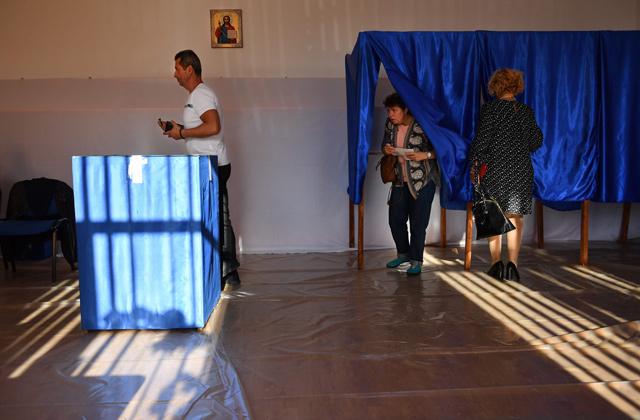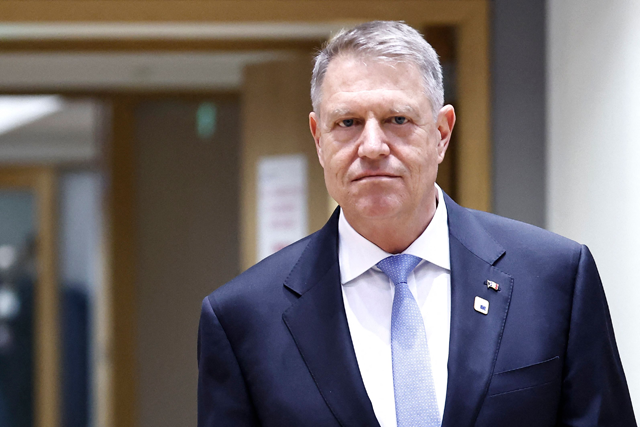You are here
Romania president on top in first-round vote
By AFP - Nov 11,2019 - Last updated at Nov 11,2019
BUCHAREST — Romania's pro-Europe President Klaus Iohannis has taken a big lead in the first round of the country's presidential election on Sunday, according to partial official results.
With votes from 90 per cent of polling stations counted, Iohannis stands on just over 36 per cent, with his nearest rival, former Social Democrat (PSD) prime minister Viorica Dancila, on 24 per cent.
Iohannis claimed victory on Sunday evening in front of cheering supporters at his campaign headquarters.
"We have beaten the Social Democrats," the 60-year-old leader said.
"But the war is not over, we have to take another step forward in two weeks," he said, referring to the second round ballot on November 24.
Iohannis now seems "assured of a second five-year term" as voters for lower-placed candidates will largely swing behind him, political analyst Andrei Taranu told AFP.
A Iohannis victory would potentially add to a liberal fightback against the region's prevailing nationalism, following the election of an anti-corruption activist as Slovakia's president and a centre-left candidate as mayor of the Hungarian capital Budapest.
Dancila meanwhile said she was "happy" with the result, adding: "We are present in the second round, I thank those who voted with their hearts."
The PSD has become increasingly reliant on an ageing, rural electorate and had feared the nightmare scenario of not making it to the second round, which would have been a first in Romania's post-communist history.
A record 650,000 votes from Romanians abroad — who tend to favour liberal candidates — will take longer to count but analysts say they will likely not be enough to knock Dancila out of the race.
The third-placed candidate, Dan Barna from the recently-formed pro-EU Save Romania Union Party, is on around 13 per cent.
'Pro-European signal'
Iohannis, who hails from the centre-right National Liberal Party (PNL), repeatedly clashed with the beleaguered PSD government, which collapsed last month.
Dancila served as the last prime minister in that government, which took power after the PSD won parliamentary elections in 2016.
The PSD looks to have lost 16 percentage points when compared with the 2016 election.
The PSD government had engaged in a long battle with Brussels — and Iohannis who backed the EU — over allegations it was trying to push through controversial judicial reforms in order to neuter the judiciary and benefit PSD politicians.
Iohannis had made the rule of law a central plank of his campaign.
While nationalism has been less present in Romanian politics than in Hungary or Poland, the PSD had tried to frame its clashes with European Union institutions as evidence that the party was standing up for Romania.
However, as the German magazine Osteuropa pointed out in a recent editorial, at May's European Parliament elections "while Fidesz and [Poland's ruling] PiS Party won on the back of anti-Brussels campaigns, Romanian voters punished the government and sent a pro-European signal".
'Electing our future'
The PSD's heavy losses in the European polls added to a series of travails for Dancila's government which eventually saw it brought down by parliament in a no-confidence vote last month.
"In the absence of a powerful leader, the party has no more strength," says Taranu, alluding to the jailing in May of former party boss Liviu Dragnea on corruption charges.
Earlier this week MPs gave their backing to a new government led by the PNL's Ludovic Orban.
Respected 103-year-old philosopher Mihai Sora, who has a large social media following, said of Sunday's vote that "we are not just electing a man, we are electing our future".
Sora has become the spokesman for tens of thousands of protesters who have regularly taken to the streets against the drift to the left and in favour of an independent judiciary.
Iohannis, a former physics teacher and mayor of the city of Sibiu, had warned that a PSD win would have been a threat to democracy.
The left-wing party is seen as the successor of the elite which dominated the country before the overthrow of communism in 1989 and is accused of harbouring corruption in its ranks.
Sociologist Vasile Dancu said the PSD would be "seeking a new identity" after its tumultuous period in office.
After starting strongly early on Sunday, turnout tailed off towards the evening and was estimated at 48 per cent, compared with 52 per cent five years ago.
In total 14 candidates stood in the first round, in the country of 19.7 million people.
Related Articles
BUCHAREST — Romania voted in the first round of a presidential election on Sunday, with pro-European incumbent Klaus Iohannis the favourite
BUCHAREST — Romania's pro-European government collapsed in a parliamentary no-confidence vote on Wednesday after only three months in office
BUCHAREST — Romanian President Klaus Iohannis announced his resignation on Monday after a procedure to impeach him was launched and as anger

















